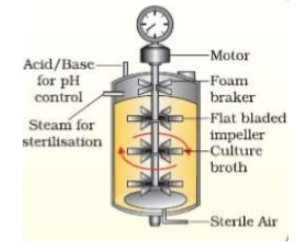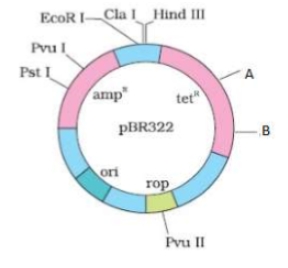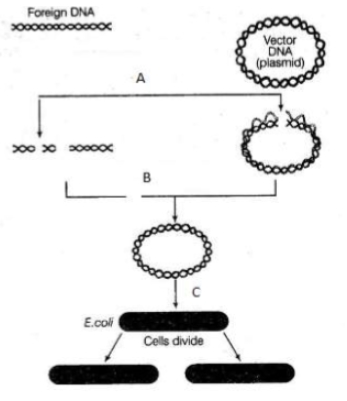The bioreactor shown in the diagram is:

1. Sparged stirred tank type
2. Airlift type
3. Simple stirred tank type
4. Fluidized bed type

What is true about the steps of PCR shown in the diagram given below?

l. Step A occurs at the temperature of 95-98 C
ll. Step B occurs at the temperature of 55 C
lll. Step C occurs at the temperature of 72 C
1. l and ll only
2. l and lll only
3. ll and lll only
4. l, ll and lll
A and B in the pBR 322, shown in the diagram given below, respectively represent recognition sequences of :

1. BamH I and Sma I
2. Hind II and Sma I
3. BamH I and SaI I
4. SaI I and Hind II
What is true A,B and C in the given diagrammatic representation of rDNA technology ?

I. At A same restriction enzyme is used to cut both foreign and vector DNA
II. The enzyme used at B is DNA ligase
III. Step C can be called as transformation
1. I and II only
2. I and III only
3. II and III only
4. I,II and III
According to traditional view which of the following can be kept under the process or form in Biotechnology?
1. Test tube baby
2. DNA vaccine
3. Making of wine
4. Correcting a gene
If you transfom a cell with an alien piece of DNA only, What is the possibility?
| 1. | This alien piece becomes a part of host genome. |
| 2. | It doesn't become a part of host's genome but keeps on replicating |
| 3. | The cloning of gene won't get affected in the absence of Origin of replication. |
| 4. | Multiple identical copies of alien piece of DNA can be formed irrespective of its integration into host's genome. |
In the year 1963, the two enzymes responsible for inhibiting the growth of bacteriophage in E. coli were isolated. One of them was
1. Ligase
2. Polymerase
3. Molecular scissor
4. Antibiotic resistance enzyme
Today we know more than …….. restriction enzymes that have been isolated from over……..strains
1. 700; 350
2. 900; 230
3. 600; 270
4. 550; 210
Restriction endonuclease
| 1. | Directly recognizes specific sequence |
| 2. | Makes the cut at sugar-phosphate core. |
| 3. | Comes under nuclease |
| 4. | Both A and C |
Which of the following step is first one in order to separate DNA fragments?
| 1. | Running of gel | 2. | Staining of gel |
| 3. | Elution | 4. | Setting of gel |






